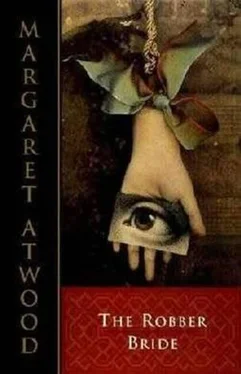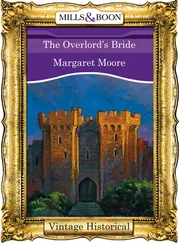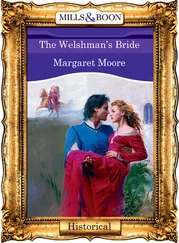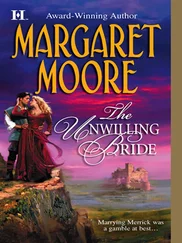Tony has made coffee, grinding the beans herself she serves it with cream, in defiance of cholesterol. Sooner or later, as their arteries fill with sludge, they will have to give up cream,but not just yet. West sits eating his egg; he’s absorbed in it, like a happy child. The bright primary colours—the red cups, the yellow tablecloth, the orange plates—give the kitchen a playground air. His grey hair seems a fluke, some unaccountable transformation that’s been worked upon him overnight. When she first knew him he was blond.
“Good egg,” he says. Small things like good eggs delight him, small things like bad eggs depress him. He’s easy to please, but difficult to protect.
West, Tony repeats to herself: She says his name from time to time, silently, like a charm. He didn’t use to be West. Once—thirty? thirty-two years ago?—he was Stewart, until he told her how much he hated being called Stew; so she reversed him, and he’s been West ever since. She cheated a little, though: strictly speaking, he should have been Wets. But that’s what happens when you love someone, thinks Tony. You cheat a little.
“What’s on your agenda for today?” says West.
“Want some more toast?” says Tony. He nods and she gets up to tend the toaster, pausing to kiss the top of his head, inhaling his familiar scent of scalp and shampoo. His hair up there is thinning: soon he’ll have a tonsure, like a monk’s. For the moment she’s taller than he is: it isn’t often she gets such a bird’s-eye view.
There’s no need for West to be told who she’s having lunch with. He doesn’t like Roz and Charis. They make him nervous. He feels—rightly—that they know too much about him. “Nothing very exciting;” she says.
After breakfast West goes up to his third-floor study to work, and Tony changes out of her dressing gown, into jeans and acotton pullover, and marks more papers. From upstairs she can hear a rhythmical thumping, punctuated by what sounds like a mixed chorus of mating hyenas, cows being hit with sledgehammers, and tropical birds in pain.
West is a musicologist. Some of what he does is traditional—influences, variants, derivations—but he’s also involved in one of those cross-disciplinary projects that have become so popular lately. He’s mixed up with a bunch of neurophysiologists from the medical school; together they’re studying the effects of music on the human brain—different kinds of music, and different kinds of noises, because some of the things West comes up with can hardly be thought of as music. They want to know which part of the brain is listening, and especially which half of it. They think this information may he useful to stroke victims, and to people who have lost parts of their brains in car accidents. They wire people’s brains up, play the music—or noises—and watch the results on a coloured computer screen.
West is very excited about all of this. He says it’s become clear to him that the brain itself is a musical instrument, that you can actually compose music on it, on someone else’s brain; or you could, if you had free rein. Tony finds this idea distressing—what if the scientists want to play something that the person with the brain doesn’t want to hear? West says it’s only theoretical.
But he has a strong urge to wire up Tony, because of her lefthandedness. Handedness is one of the things they study. They want to attach electrodes to Tony’s head and then have her play the piano, because the piano is two-handed and the hands both work at the same time, but on different notations. Tony has avoided this so far by saying she’s forgotten how to play, which is mostly true; but also she doesn’t want West peering in at anything that might be going on in her brain.
She finishes the set of papers and goes back to the bedroom to change for lunch. She looks into her closet: there isn’t a lot of choice, and no matter what she wears, Roz will narrow her eyes at it and suggest they go shopping. Roz thinks Tony goes in for too much floral-wallpaper print, although Tony has carefully explained that it’s camouflage. Anyway, the black leather suit Roz once tried to convince her was her real self just made her look like an avant-garde Italian umbrella stand.
She finally settles on a forest green rayon outfit with small white polka dots that she bought in the children’s section at Eaton’s. She buys quite a few of her clothes there. Why not? They fit, and there’s less tax; and, as Roz is never tired of remarking, Tony is a miser, especially when it comes to clothes. She would much rather save the money and spend it on airplane tickets for visits to the sites of battles.
On these pilgrimages she collects relics: a flower from each site. Or a weed rather, because what she picks are common things—daisies, clovers, poppies. Sentimentalities of this kind seem reserved, in her, for people she does not know. She presses the flowers between the pages of the Bibles left by proselytizing sects in the dresser drawers of the cheap hotels and pensions where she stays. If there’s no Bible she flattens them under ashtrays. There are always ashtrays.
Then, when she gets home, she tapes them into her scrapbooks, in alphabetical order: Agincourt. Austerlitz. Bunker Hill. Carcassonne. Dunkirk. She doesn’t take sides: all battles are battles, all contain bravery, all involve death. She doesn’t talk about this practice of hers to her colleagues, because none of them would understand why she does it. She isn’t even sure herself. She isn’t sure what she’s really collecting, or in memory of what.
In the bathroom she adjusts her face. Powder on the nose, but no lipstick. Lipstick is alarming on her, extra, like those red plastic mouths children stick onto potatoes. Comb through the hair. She gets her hair cut in Chinatown because they don’t’ charge the earth, and they know how to do straight black short hair with a few straggly bangs over the forehead, the same every time. A pixie cut, it used to be called. With her big glasses and her big eyes behind them and her too-skinny neck, the effect is street urchin crossed with newly hatched bird. She still has good skin, good enough; it offsets the grey strands. She looks like a very young old person, or a very old young person; but then, she’s looked that way ever since she was two.
She bundles the term papers into her outsized canvas tote bag and runs up the stairs to wave goodbye to West. Headwinds, says the sign on his study door, and that’s what his answering machine says too—Third floor, Headwinds. It’s what he’d call his high-tech recording studio if he had one. West has his earphones on now, he’s hooked up to his tape deck and his synthesizer, but he sees her and waves back. She leaves by the front door, locking it behind her. She’s always careful about the door. She doesn’t want any drug addicts getting in while she’s away, and bothering West.
The wooden porch needs repairing; there’s a rotting board. She’ll have it fixed next spring, she promises herself it will take at least that long to get such a thing organized. Someone has tucked a circular under her doormat: another tool sale. Tony wonders who buys all these tools—all these circular saws, cordless drills, rasps, and screwdrivers—and what they do with them really. Maybe tools are substitute weapons; maybe they’re what men go in for when they aren’t waging war. West is not the tool-using type, though: the only hammer in the house belongs to Tony, and for anything other than simple nailpounding she looks in the Yellow Pages. Why risk your life?
There’s another tool circular cluttering the tiny front lawn, which is weed-ridden and needs cutting. The lawn is a neighbourhood blot. Tony knows this, and is embarrassed by it from time to time, and vows to have the grass dug up and replaced with some colourful but hardy shrubs, or else gravel. She has never seen the point of lawns. Given the choice she’d prefer a moat, with a drawbridge, and crocodiles optional.
Читать дальше












